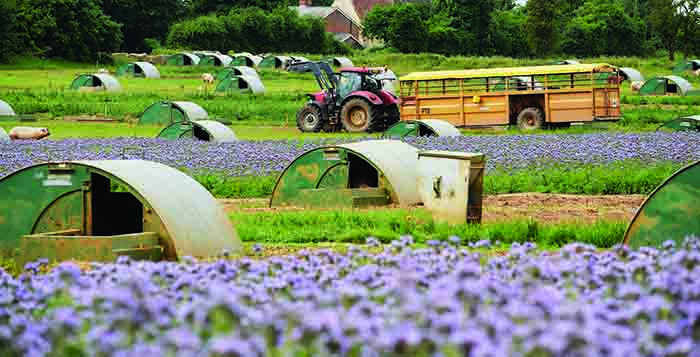Mark Hayward, with his brother Paul, runs Dingley Dell Pork, in Suffolk, a 900-sow farrow-to-finish unit, with a big focus on welfare and the environment, and a breeding programme that selects for intramuscular fat to enhance taste
So, a late-night alcohol-fuelled conversation with Alistair at the National Pig Awards has resulted in me putting pen to paper.
It will be January when you read this, so I guess it’s that time of year to set the tone for 2020 and all it shall bring.
Among other things, 2019 was definitely the year in which environmental concerns over farming, and in particular beef, began to be discussed regularly in the media. For us, this is interesting, as for the last four or five years we have felt that this concern would come and that, at some time in the future the idea of ‘sustainability’ in livestock production would become an issue of the same magnitude as animal welfare.
So what are our thoughts and solutions on this? For me and my brother, Paul, it’s a simple question. Are we pushing nature out as a result of what we do, or are we being inclusive to nature around us and having a positive effect?
So, what is a positive effect?
Well, our simple and tangible answer is that we can improve the numbers and diversity of species that we share our farm with, and consequently help this ecosystem that we are directly responsible for.
For the fourth year running, we will be planting 34 hectares (83 football fields) of nectar-rich plants as part of our ‘A million bees on farm’ project, where we hope to measure that number of bumblebees across the whole farm on one day.
By planting our whole pig site with either grass undersown with clover or tranches of flowers and moving the animals both more regularly and on to these areas, we are able to provide huge amounts of nectar for bees and pollinators from early June through to September (staggered planting and topping help manage this).
More insects equates to more birds and, consequently, more small animals and predators. For our market, which is chefs and foodservice, we have several hundred visitors a year to the farm and spend a lot of time with chefs off-farm, both in the UK and abroad.
Our bee project, when presented to them, is both easily understood, tangible and, ultimately, quantifiable, so they know how they purchase their meat not only affects how the animal was reared and cared for, but also how the environment and ecosystem was affected.
OK, so what’s this got to do with me, you might ask?
Well, it’s simple – we as a business are involved in a specific sector, foodservice, supplying chefs, hotels, airlines, private schools and all kinds of businesses.
In my opinion, this sector and the chefs we see on television dictate and influence the direction and travel of consumers, who potentially affect the direction and travel of the retailers, which is what the bulk of agriculture supplies.
Now, what doesn’t go there is exported generally as a commodity (in terms of price, when currency allows), although each country tries to export its generic meat – British pork or New Zealand lamb or whatever – as a brand.
Some countries, for whatever reason, become synonymous with quality – Scottish Beef is a good example. We work in several countries and I see no reason why Brand Britain shouldn’t position itself across the species into this space, which can be ‘regenerative agriculture’ or ‘rebuilding ecosystems’ or whatever the appropriate term should be.
We live and farm in a temperate climate and we could do much for nature (and believe me, the more we dothemorewewanttodo–feed the bees, feed your soul).
It is a way of not only countering the negativity towards meat production systems and having a positive and tangible environmental impact, but also, from a potential export point of view, of improving the perception of brand Britain.
I’m not in any way advocating that everyone should do this on the scale we do, but I think if we all did a bit, or at least started the conversation, it wouldn’t be a bad topic for the start of a brand new year.




